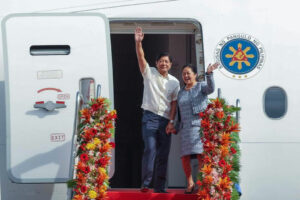
Marcos cites need to boost economic cooperation with ‘like-minded’ nations
By Kyle Aristophere T. Atienza, Reporter
PRESIDENT Ferdinand R. Marcos, Jr. on Monday cited the need to boost economic partnerships with “like-minded” nations or countries respecting international law, in a remark made against the backdrop of heightening tensions in the South China Sea.
Mr. Marcos left the Philippines on Monday for his visit to Germany until March 13, and to the Czech Republic on March 13-15, vowing to “underscore our unwavering commitment to strengthening partnerships with like-minded countries promoting the rules-based international order.”
In his departure speech, the Philippine leader said he will focus on expanding economic cooperation with the two Central European nations, citing the need for more “mutually beneficial trade and investment opportunities.”
“We wish to tap Germany’s expertise in renewable energy to assist us in our energy transition efforts, as well as on manufacturing, healthcare, agriculture, aerospace, innovation and startups, IT-BPM, minerals processing,” he said.
“In the same vein, we wish to harness the Czech Republic’s expertise on agriculture, manufacturing, especially in the automotive industry, transportation, renewable energy, space, and scientific instruments that they have been leading the world in, in terms of technology,” he added.
While in Germany, Mr. Marcos will witness the signing of a joint declaration of intent to boost cooperation in maritime trade.
The deal, which will be signed by both countries’ transportation agencies, would facilitate the mobility of Philippine- and German-owned commercial vessels.
A cooperation program between the Technical Education and Skills Development Authority and the German Federal Institute for Vocational Education and Training will also be sealed.
In the Czech Republic, on the other hand, Mr. Marcos will witness the signing of a cooperation deal for the safe and orderly migration of Filipino workers.
Mr. Marcos said his government is eager to invite German and Czech businesses to consider the Philippines as “a production hub for their products.”
His trip to the two European nations followed the visits to Manila of Czech Prime Minister Petr Fiala in April last year and German Federal Foreign Minister Annalena Baerbock in January.
The European trips also followed Mr. Marcos’ state visit to Australia in late February, where he said in front of Australian lawmakers that Manila is on the frontline of a battle for regional peace.
Tensions between the Philippines and China in the South China Sea have increased, with the Chinese coast guard firing water cannons and conducting dangerous maneuvers to block Philippine missions for Filipino fishermen and troops within Manila’s 200-nautical mile exclusive economic zone.
Earlier this month, the Chinese coast guard’s blocking maneuvers and firing of water cannons damaged Philippine resupply vessels and injured at least four Navy personnel.
“Manila’s attempt to optimize its partnership with the European Union (EU) is mutually necessary given the structural changes in the international system,” said Joshua Bernard B. Espeña, who teaches international relations at the Polytechnic University of the Philippines.
He noted that the EU has been diversifying its economic partnerships “in an attempt to de-risk from China and Russia.”
“Meanwhile, the Philippines also wanted to go beyond the US and China as the only major sources of its trade,” he added. “Not to mention that Manila provides a large source of seafarers needed in European shipping companies in post-COVID production to boost the global supply chain.”
Mr. Espeña said the Philippines needs to gather all possible allies and partners to reap “economic benefits as much as possible to absorb the shocks of the fallout of future conflicts that may affect the Philippines.”
China remained the largest source of Philippine imports in 2023, accounting for $29.38 billion of the total. It was followed by Indonesia ($11.51 billion), Japan ($10.26 billion), South Korea ($8.48 billion), and the US ($8.41 billion).
But the US was the largest destination of Philippine products in the same year, accounting for $11.54 billion or 15.7% of the country’s export value. It was followed by China ($10.86 billion), Japan ($10.45 billion), Hong Kong (8.84 billion), and South Korea ($3.53 billion).



